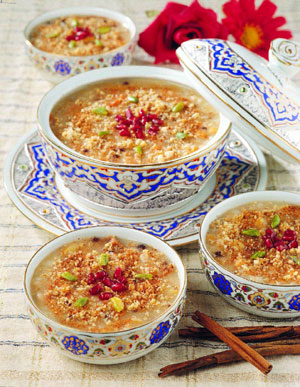

Noah's Pudding (Ashure)
 The
Prophet Noah called his people to the religion of God for nine hundred
and fifty years. When his people insisted on unbelief and persisted in
their wrongdoings, God ordered him to build an ark. After completing the
construction of the ship, Noah embarked in it, upon God's command,
"...of each kind two, male and female, his family-except those against
whom the Word (of punishment) had already gone forth,-and the believers."
(Qur'an 11:40).
The
Prophet Noah called his people to the religion of God for nine hundred
and fifty years. When his people insisted on unbelief and persisted in
their wrongdoings, God ordered him to build an ark. After completing the
construction of the ship, Noah embarked in it, upon God's command,
"...of each kind two, male and female, his family-except those against
whom the Word (of punishment) had already gone forth,-and the believers."
(Qur'an 11:40).
When the waters of the great Flood began to recede, there was great joy and the believers offered thanks to God. Prophet Noah and his family are said to have gathered up all of the food remaining on the Ark and transformed it into a delicious pudding. Since that day, Muslims prepare this delicacy yearly in remembrance of what Noah and his people had experienced. This sweet dish is called "Noah's pudding" or "ashure".
What are the ingredients?
There are various recipes, but the essential ingredients are: wheat, rice,
sugar, nuts, dried fruit, beans, raisins and sesame seeds. All the ingredients
are boiled together until they reach a thick porridge-like consistency.
This dessert is served cold. Click for a detailed
recipe.
Sharing ashure is a symbolic representation of the unity
and essential relationship of humans to one another and to their Creator.
The making of ashure is a common practice among Muslim and Christian people
in the Middle East. In Turkey, it is customary to prepare ashure at a
certain time of the year. Christian communities throughout the Middle
East prepare a similar sweet wheat dish, called hedik, amah or qamhiyyi.
Ashure prepared at home is shared with neighbors. Generally people who
prepare ashure send a cup to each of the neighbors in their building.
As tradition goes the residents of forty houses to your east, west, north
and south are considered neighbors. One has the responsibility of maintaining
good relations with their neighbors regardless of what their religion
or beliefs may be. It is also a custom to prepare ashure in large cauldrons
and distribute it to the poor.
Click on a picture to enlarge it.



